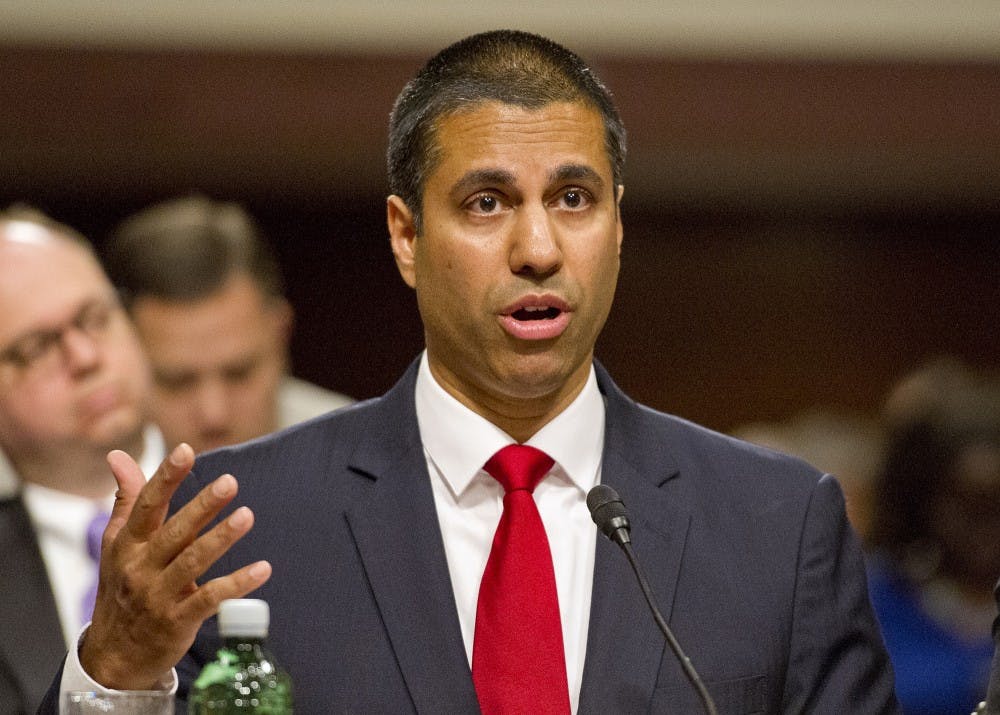In an 3-2 party-line vote, the Federal Communication Commission voted to repeal Obama-era net neutrality provisions in their Dec. 14 meeting.
Net neutrality, the concept that all Internet traffic should be treated equally, was the basic premise of the Obama-era regulations and even during the George W. Bush presidency.
While both repeal supporters and dissenters argued long, the decision came down to FCC chairman Ajit Pai who has repeatedly criticized the neutrality regulations as a micromanagement of the Internet.
Pai called the claims of some net neutrality supporters as "outlandish" and needlessly "apocalyptic" during the meeting.
He explained that before the adoption of net neutrality in 2015, these fears had not been realized and would not be after the rules were repealed.
“Simply put, by returning to the light touch Title I framework, we are helping consumers and promoting competition," Pai said during the meeting.
Commissioner Mignon Clyburn cited the millions of comments, letters and statements coming out in support of Net Neutrality rules that were being ignored.
She said this repeal will create a “toothless” FCC, without real power to regulate big businesses.
“I dissent," Clyburn said. "I dissent from this spun, legally lightweight, consumer harming, corporate enabling, destroying internet freedom order."
Commissioner Michael O'Reilly and Brendan Carr, both supporters of the repeal, asked people to relax.
O'Reilly said this repeal of Title II and Net neutrality rules was not going to "break the internet" but will allow a more light-handed approach to Internet regulations.
"In the end I’m simply not persuaded that heavy-handed rules are needed to protect against hypothetical harm,” O'Reilly said.
And at the end of the debate, Pai's free market ideology won out among the commissioners, if not the public.
What does this net neutrality repeal mean for individuals and businesses?
Without these protections, internet service providers would be allowed to block video streams or charge extra for access to sites like Netflix or YouTube.
This move largely favors Telecommunication companies like AT&T, Verizon and Comcast who can now throttle back, or speed up broadband internet connections as long as they disclose it to the public.
Not only could individuals be paying more for access, but larger companies could be forced to pay more as well to ensure their videos and content are streamed at the same speeds and quality of other sites.
To put this in perspective, Verizon owns Yahoo and AOL. Under the 2015 net neutrality rules, Verizon was not allowed to favor those sites, or charge a company like Google extra to connect with Verizon customers. After the repeal, Verizon could do just that.
ISPs and supporters argue that there is no real incentive to do that as the Federal Trade Commission will still maintain the ability to take measures against noncompetitive maneuvers.
Some internet providers argue that they have no financial incentive to penalize specific services or content, and customers would benefit from the new rules and competition.
But net neutrality supporters are skeptical.
However, the repeal will not take effect for approximately 60 days as the rules need to be published in the Federal Register. In the meantime, the repeal may be challenged in court.
Some other agenda items
-The FCC agreed to create a new "blue" alert that would act in a similar manner as Amber alerts and alert the public to attacks or dangers for law enforcement officers.
-FCC voted to review their rural healthcare program which works to improve the quality of health care available to rural communities by ensuring access to broadband and telecommunication services.
-FCC eased the development and deployment of wireless infrastructure on “Twilight Towers.” These are towers built between 2001 and 2005 that did not go through the National Historic Preservation Act's Section of review.
Dominick Jean




